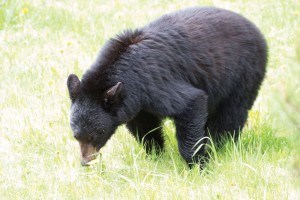
Parks Canada was forced to kill a male black bear, May 21, after an aggressive encounter with a group of people near the Valley of the Five Lakes.
This is the first time Parks has had to kill a bear in Jasper National Park since 2014—when two bears were killed under similar circumstances.
“It’s pretty rare that we have to do this. We do everything to not shoot bears,” said Mark Bradley, a Parks Canada wildlife biologist.
According to Bradley, the group was getting ready to go fishing at the fifth lake when they encountered the bear.
He said only moments earlier the group had put down their backpacks to prepare their boat, but when they turned back around to get their bags they came face-to-face with a 200-pound black bear that had grabbed their packs and started eating their food.
By coincidence there happened to be a Parks employee nearby who noticed the bear and immediately called Parks’ human-wildlife conflict specialists.
“There had already been a few reports of this bear approaching cars on Highway 93 which indicated that people had been feeding it,” Bradley said.
When the two specialists arrived, the bear had already moved down the trail.
Using photos of the bear the fishing group had managed to capture, the wildlife specialists began to search for it, but before they could get very far they heard the group yelling that the bear had returned and was coming back towards them.
“They went back and got between the bear and the fishermen and they were yelling and got their firearms ready—it wasn’t turning around it kept approaching even with all the yelling,” Bradley said. “At that point they deemed it to be an excessive risk to human safety.”
The bear was shot on site with a 12-gauge shotgun. Bradley estimated the bear was five to seven years old based on teeth wear.
After it was dead, Bradley said the bear was taken deep into the woods far from human contact where it can decompose naturally.
“You can’t leave it nearby because if a grizzly bear takes possession of that carcass then the grizzly bear would become dangerous to people,” Bradley said.
According to Bradley, the bear probably wouldn’t have approached the group if it hadn’t already been accustomed to human food.
“The big problem is if the bears get into human food then it’s pretty much impossible to teach them to fear humans again,” Bradley said. “The main message we want to get out is don’t throw food to bears from your car and don’t leave food lying around.”
In the past few weeks Parks have received numerous calls about both black and grizzly bear sightings throughout JNP.
“This is the time of year that we’re going to see a lot of bears. We’ve had lots of staff out investigating and making sure the bears and people are safe,” Bradley said.
He advised hikers to travel in groups, carry bear spray, and if you must bring your dog then make sure it’s on a leash. If you do encounter a bear give it lots of space and make plenty of noise.
People are urged to report all bear sightings to the Jasper National Park’s resource conservation office at 780-852-6155.
Kayla Byrne
[email protected]
